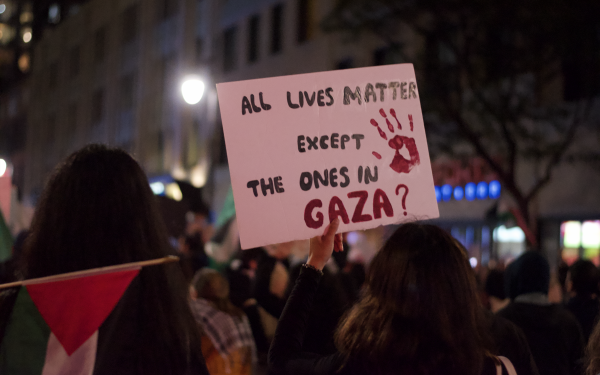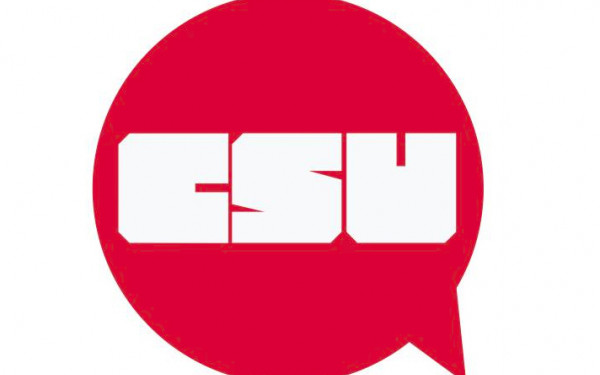Canary Mission Is An Online Blacklist for BDS Activists
Canary Mission Correlates Anti-Semitism With BDS, Doxxing Supporters of the Movement
In a day and age where online data faces concerns from the greater population, with websites like Facebook selling our data or hackers releasing our information to the public, for some communities, such as those involved in Palestinian activism, the internet can provide a great threat to safety and security.
Canary Mission, a website used to dox supporters of BDS—the Boycott, Divestment and Sanctions movement in relation to the state of Israel—works to release the identity of supporters, correlating this activism to anti-Semitism, and ousting supporters as racist. Since its establishment in May 2015, Canary Mission has doxed BDS activists on Canadian and American campuses, professors included.
“We always feel under surveillance, certainly in the Palestinian-Arab community,” said Henry Cook*, a member of Solidarity for Palestinian Human Rights Concordia. “Our parents, while growing up, they tell us to watch out—the basic, ‘Do not talk to strangers’ and what not—but they always tell us to not get too involved with the causes for SPHR, even if it’s the right thing,” he said.
Cook said his parents don’t know about Canary Mission, but they have always told him to stay away from Palestinian activism to not endanger his career, as they understand there’s a blacklist for Palestinian activists.
Palestinian activists are always a target, he said, even if they aren’t doxxed and listed on sites like Canary Mission. “For example, I have a Canadian passport, I was born here and raised here, I travel a lot and every time I travel I always get questioned and what not.”
Cook said he has been able to remain off the site due to not publicizing his name online alongside his BDS activism.
“Most people, even in the Palestinian activist community, they don’t know me by my name, they just call me by my Instagram username,” he said. “I guess that’s a way I’ve been able to stay out of it.”
Cook said some fear can stem from Canary Mission either impacting one’s future career or being barred from entering Palestine. When mentioning a colleague that is listed on the website, he said, “His chances of ever seeing Palestine are next to none.”
There has been speculation that information from Canary Mission has been used to prevent those with profiles on the site from entering Israel and Palestine at the Israeli border before entry. Some accounts of this have surfaced. However, it’s unclear to what extent the Israel Defence Forces utilize the site.
Canary Mission was unable to answer this question before publication, however in an article by The Aggie_—a student paper at the University of California, Davis—Canary Mission told journalists they have no connection to the Israeli government. “Individuals, journalists or organizations are free to use our material as they wish,” a representative from Canary Mission wrote in an email to _The Aggie.
“The population most at risk by Canary Mission are Palestinians who want to visit their family in Palestine,” said Maya Edery, campus coordinator for Jewish Voices for Peace, a left-wing activist organization based in the U.S. and focused on the Israeli–Palestinian conflict.
“The [Israel Defence Forces] has long searched for any kind of activist history before allowing Palestinians in the country, efforts that have only increased in recent years.” She said this is fundamentally anti-democratic behaviour and described these tactics as a form of violence.
The Israeli-Palestinian conflict is a complex topic, one that cannot be simply boiled down to a two-state solution within today’s political realm. While action to address and push for change is taken from both sides, BDS is one of the most controversial movements that has gained popularity in North America.
BDS aims to put pressure on Israel to pull out their settlements from Palestinian territory through the economic boycott of Israeli products and academics. This furthers controversy between sides, as some Israel supporters identify this as a threat to the Jewish state, while some supporters of Palestine often regard it as the last recourse to save Palestinian land.
“BDS is anti-Semitic. It is a movement determined to undermine and destroy Jewish self-determination,” explained a representative from the Canary Mission team via email, which works anonymously to protect the identities of those involved.
“The desired outcome of the BDS movement is for Israel to be eradicated, so supporters of the economic boycott of Israel fulfill the criteria of applicability as per the ethics policy on our website,” the representative continued.
Canary Mission’s website lists that any individual or organization can get placed on the website if they are anti-Semitic, or if they support a group that has been listed as terrorist, such as Hamas, or if violate the safety of Jews or Israelis, disrupt Jewish or pro-Israel events, incite violence on those groups, use language to demonize Jews, Israelis or Israeli supporters, or support or promote BDS.
The website claims that all information written on their profiles has been gathered from open sources on the internet. The website also states that they avoid intentionally adding embellishments or opinions to the information they publish.
***
For the purposes of this article, The Link spoke to four BDS activists who have been listed on Canary Mission and one who has not been listed on the site. Five of the sources have been granted anonymity at their request to avoid further online harassment and threats to their safety.
A Concordia student who has been listed on Canary Mission, Steve Bryce* said much of the information on his profile was taken from an interview that he was told would be for a project, but later found the information published on Canary Mission.
He said the encounter took place after BDS was endorsed by the Concordia Student Union in 2014. “I was interviewed by a […] ‘journalism student’ that was interested in doing a project on Palestinian activism on campus,” said Bryce. “They promised me that it would be private, and that it’s just for a project for their professor.”
He said after a month he found himself on Canary Mission with the same information he provided in the interview. “They quoted me, but twisted the interpretation of my interview,” said Bryce.
When asked if Canary Mission uses tactics such as interviewing BDS activists on a different pretence to be used on the website, the same Canary Mission representative said no.
Hannah Stanton*, a former McGill student involved in Solidarity for Palestinian Human Rights McGill, said she found her profile to be manipulated as well. She said her profile mostly involved screenshots of opinions she had posted on Facebook, or things she had said during SPHR McGill meetings.
“They purposely try to create associations between individuals and things like Hamas and acts of anti-Semitism that have absolutely nothing to do with you,” said Stanton. “On my page there’s a whole section on like Hamas and the wider [Students for Justice in Palestine] movement and how SJP activists supposedly harass Jewish students.”

A section of her profile discusses how SJP activists frequently intimidate and harass Jewish and pro-Israel students. Stanton said these narratives don’t apply to her or her experience at McGill, either.
“If any anti-Semitic statements or harassment of Jewish students did happen at McGill it was not done by anyone associated with SPHR,” said Stanton. “Our group was together the whole time and [not] one of us ever thought it was OK to personally attack another person and we understood that that would be discrediting to the movement.”
“So the fact that they’re trying to conflate all the issues that have ever happened across North America with all pro-BDS activism and put it on my page to indirectly draw links to it is where the manipulation comes in,” she said.
In an interview with The Intercept, one attorney from Palestine Legal, a group that has interviewed more than 200 people who were doxed on Canary Mission, reported some have received death threats, racial harassment and damaged professional relationships as a result of the site. They also heard that one person was denied a bank account after finding themselves on the site.
Former Concordia student and BDS activist Gregory Holland* said that in his network the site’s harassment hasn’t worked. “We’re still getting hired, we’re still performing, we’re still doing great stuff—but I think that we should not get distracted,” he said, “use Canary Mission as a way to empower us, to really remind ourselves that what we’re doing is working.”
Instead, he said having a Canary Mission page shows that activists are being effective.
“We always feel under surveillance, certainly in the Palestinian-Arab community, just in general.”
— Henry Cook
***
Jewish Voices For Peace condemns Canary Mission. However, Independent Jewish Voices, an organization that represents Canadian Jews committed to social justice and human rights, does not have a stance on the conflict, according to Mindy Davis*, a Concordia representative for Independent Jewish Voices.
Davis said they can’t speak for every Independent Jewish Voices member, but said many see Canary Mission as a scare tactic.
Davis found themselves on Canary Mission circa the end of 2017 or the beginning of 2018. As an active member of Independent Jewish Voices at Concordia, Davis mobilized for BDS support and to discourage Jews from attending Birthright—which allows them to return to the holy land in Israel for free to learn about the roots of Judaism.
Davis said they had a mixed reaction being on the website. “On the one hand, I have a very Zionist mother and I know she sometimes out of the blue googles my name,” they said. “So my first reaction was concern that she’s going to find out and there will be consequences.”
They said their second reaction was that they must be doing something right.
Davis highlighted that most of these profiles on Canary Mission are of racialized people. “It’s more of a threat for them and I’m sure it’s more intimidating to be publicly outed and have their names associated with the way Canary Mission words it,” such as stating they are a terrorist or anti-Semitic. They said there are also a sizeable amount of Jews on the website being labeled as anti-Semites.
“In the three years we have been fighting Canary Mission, the overall impact we’ve witnessed from Canary Mission has been the creation of a culture of fear that intentionally targets some of the most vulnerable students on U.S. campuses,” said Edery.
Edery said Canary Mission uses overly broad definitions of anti-Semitism, aiming to paint advocates for Palestinian human rights as anti-Semitic.
She said there have been some anecdotal stories of a few students being questioned by the university administration over allegations made by the site, but those concerns, “Were subsequently cleared up once more information about Canary Mission’s McCarthyist approach came out.”
Edery said no one from Jewish Voices for Peace’s knowledge has been fired from their job for being listed on the website, but it’s impossible to tell if applicants for jobs haven’t been selected due to Canary Mission’s posts.
“Canary Mission does all of this in the name of Jewish students’ safety, but groups like Canary Mission actually endanger students by subjecting them to hate mail and other forms of harassment,” Edery said.
Jewish Voices for Peace has seen a growing trend of students resisting Canary Mission, exposing it for the racist right-wing site that it is, explained Edery.
“Students have publicly spoken out to the media,” Edery said. “They’ve organized AgainstCanaryMission.org to challenge the impact and false claims that Canary Mission makes.”
Edery said more than 1,000 professors signed a petition condemning Canary Mission, as Open Hillel–an organization described as open to interfaith relationships, and supportive of feminism and LGBTQ+ communities–has called upon Hillel International to stop supporting Canary Mission.
In the fall of 2018, a journalist from The Forward exposed those funding the site. Between November 2016 and September 2017, the Jewish Community Foundation of Los Angeles sent a series of donations totalled at $250,000 to an Israeli non-profit, Megamot Shalom, thought to operate Canary Mission.
The Helen Diller Family Foundation sent $100,000 to the Central Fund of Israel, a New York-based charity that operates as a conduit for U.S. taxpayers looking to make tax-exempt donations to right-wing and extremist groups in Israel.
Within the tax filing, the Helen Diller Family Foundation included the message “Canary Mission For Megamot Shalom,” as uncovered by The Forward. This indicates that that the grant to the Central Fund of Israel was designated for Canary Mission through sending money to Megamot Shalom.
A link between Megamot Shalom and Canary Mission has been speculated ever since Jonathan Bash, a British-born Jerusalem resident, signed Megamot Shalom’s 2016 financial reports. Two sources that were granted anonymity separately told The Forward that Bash is the operator of Canary Mission.

Those on the website wanting to be removed are able to, however, they have to denounce the actions that have placed them on the website. The identities of those who have done so, listed as Ex-Canaries, remain anonymous to prevent harassment. The total of Ex-Canaries amounts to 15 people.
“These individuals have displayed the intellectual honesty to acknowledge the problem of anti-Semitism within anti-Israel organizations such as Students for Justice in Palestine, Jewish Voice for Peace and the [BDS] movement,” the website explained.
Conflicting Opinions on BDS
President of Concordia’s Chapter of Israel on Campus, an initiative intended to educate students on Israel’s commitments to democracy in the Middle East, culture, history, and humanitarian efforts, Laurent Cohen said that Israel on Campus does not have an official stance on Canary Mission.
He said Israel on Campus however, doesn’t support BDS. “We find it to be discriminatory and bigoted movement,” said Cohen. “[BDS’s] goals are very clear and have been stated since its inception, to destroy the Jewish state.”
Jon Levine from Hillel Concordia said Canary Mission is an off campus independent website, which neither the IOC or Hillel have relations with.
“That being said, BDS is a discriminatory movement based on national origin which denies the right to self-determination of the Jewish people on their historic and ancestral land,” said Levine. “BDS alienates many students, while also limiting academic freedom and dialogue.”
Cohen said BDS doesn’t make a distinction of where the border should be. “It makes no distinction. It is specifically targeted against destroying the world’s only Jewish state and it holds it to a completely unfair double standard that it doesn’t hold for a number of other nations.”
He said that highlighting efforts to coexist, such as a two state solution, would be a much more productive use of everyone’s time instead of isolating and harming Israel.
“I think trying to find points in mutual agreements between Israelis and Palestinians would be ideal, and just try to come together and have a conversation instead of [blocking] all voices.”
Cohen said he feels that Israel is misrepresented. “People really see it as a one sided conflict, Israel is painted as the oppressor, the Palestinians are painted as the oppressed,” said Cohen. “I’m not denying that obviously there are tons of hardships faced by Palestinians, I just don’t think that they’re being properly attributed the vast majority of the time.”
He said that the everyday struggles Israelis face are underrepresented. “For example, Israelis live in border communities that are under attack from rockets, this is something that doesn’t get spoken about at all, and I think it’s really unfair.”
Cohen said in the past IOC has provided events geared towards discussion, which he feels is more productive. “In the past we’ve worked with organizations like Stand With Us, [a non-profit pro-Israel education and advocacy organization] to bring in Israeli soldiers and have conversations with students passing by,” he said, adding that this allows students to understand people who are living on the grounds and experiencing the conflict every day.
“I think that a lot of the time that when certain Israeli voices have been brought to campus, there’s been a really strong effort to silence them, which I don’t think has been productive in advancing the interest of Israelis nor Palestinians,” said Cohen. “Events that try and focus and foster discussion would be ideal in looking for common ground, instead of highlighting the conflict all the time.”
Davis said not everyone who supports BDS is pro one state or two states, as they describe that there’s a variety of views on the best solution. They said there are also misconceptions of BDS, as they said it is not a mostly Arab community—as there are Jewish and other folks involved in BDS—and that BDS does not call to an end for Israel.
Holland said he feels BDS is correlated to anti-Semitism as an aim to delegitimize the movement.
“What [some are] trying to do is delegitimize the movement by just repeating the same narrative over and over again, until it comes true, or until they believe they were able to convince everyone that BDS is anti-Semitic,” said Holland. “There could be anti-Semites within the Palestinian movement […] just the same way there’s bad apples in every single movement, but let’s just remember the Palestinian movement is based off of equal rights.”
Holland said the three demands of BDS are ones imposed by the international community of the United Nations, which calls, “For the right of movement, the return of the Palestinian refugees,” then the third, which asks for equality for Palestinian citizens of Israel.
Davis said that BDS is comparable to the previous boycott of the South African apartheid, where countries worldwide cut professional and trade ties with the region in protest of longstanding system of racial inequality.
“[Israel] expanding illegal settlements […], this just blows my mind that they think it’s a debatable issue—it’s happening, it’s clear, the United Nations has issued [many] resolutions over it,” said Stanton.
She stressed how the borders between Palestine and Israel were decided upon in 1949.
“The BDS movement is trying to call for the respecting of those boundaries,” said Stanton. “That’s it, you don’t occupy any more Palestinian land, like go back to the borders that everyone agreed on and let people live their lives in a non-occupied way, with free movement, free ability to seek healthcare when you need it.”
Davis reiterated that BDS is not against the existence of Israelis or the existence of Jewish people. They said not buying products from Israel is a tool to push for changes within Palestinian human rights.
The opinion of those who are against or for BDS does not completely separate who supports Canary Mission or not. “If you look online even there’s Israeli groups, Zionist groups, that are against Canary Mission because it’s just intimidation,” said Cook.
He referenced an article where a Zionist had been put on Canary Mission. The article, titled “I’m A Zionist. Canary Mission Targeted Me Anyway” assesses how David Baile, a professor of Jewish history at the University of California, ended up on Canary Mission, falsely describing his views.
Cook added that he’s noticed a university in America that passed a statement that requires the university to be transparent to potential employers of a student that is on Canary Mission that the website is for intimidation purposes. He said he wants to bring something like this to Concordia.
“It’s definitely something I want to do before I leave Concordia. I still have a long way, [but] it’s in my plans,” said Cook.
Since publication, The Link has removed the name of one of the students listed on Canary Mission, replaced by an alias, in order to prevent any harassment or further doxxing at their request







